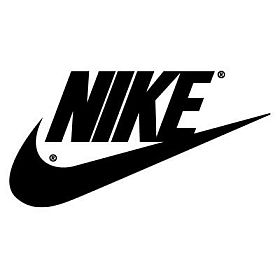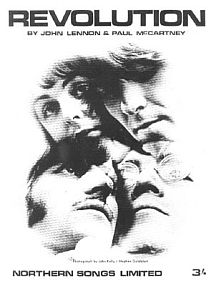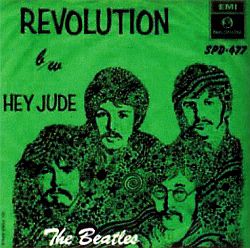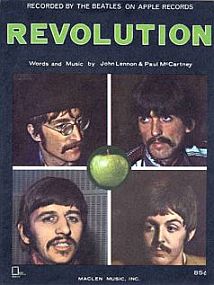
By 1987, Nike had passed 1 billion dollars in sales.
Nike was then in the process of revamping its advertising and marketing strategies and had already hooked up with a rising NBA basketball star named Michael Jordan. The company had also come up with a tag line for promoting a new group of Nike Air athletic shoes — “Revolution in Motion.” But this campaign needed some catchy music to use in its TV advertising to help launch the shoe. That’s when Nike and its advertising agency, Weiden & Kennedy, got the idea of using the Beatles’ classic 1960s’ song, “Revolution” to help sell the shoes.
However, Beatles’ music — at least in its original form as sung by the Beatles themselves — had never been used in a TV commercial before. In one case in 1985 the Beatles’ song “Help!” was used in a Lincoln-Mercury car ad, but the song was performed in that case by a sound-alike group. Nike’s ad agency, Weiden & Kennedy, wanted the real thing. “We never considered sound-alikes,” said the agency’s Kelley Stoutt, explaining Nike’s intentions for its “revolution” ad to Time magazine in May 1987. “In our minds,” said Stoutt, emphasizing the plan to use the original song, “it was the Beatles or no one.”

The Beatles, from left: John Lennon, George Harrison, Paul McCartney & Ringo Starr.

Record sleeve for 1968 Beatles’ singles ‘Hey Jude’ and ‘Revolution’. Click for 'Hey Jude' digital version; 'Revolution' later below.
Song History
“Revolution” was written by John Lennon in the spring of 1968, then a tumultuous time in the U.S. and Europe. Vietnam War protests and other civil unrest had occurred. In Paris that May, about the time Lennon wrote the song, student demonstrations had reached a fevered pitch. A massive strike there and resulting riots led to the collapse of the government of Charles DeGaulle. Lennon aimed his song at the world’s young revolutionaries, agreeing with their basic beliefs but advocating non-violence. The song, which became the Beatles first venture into political territory, was recorded in Jully 1968 at Abbey Road studios in London. It was released on B-side of the “Hey Jude” single in August that year. The single reached No. 12 on the U.S. music charts. The song was a product of the recording sessions for the Beatle’s White Album, and in fact, the original slower version of “Revolution,” sometimes called “Revolution 1,” appears on that album.
The popular and more electric version of “Revolution,” and the one that became the subject of Nike’s advertising interest, was a hard-driving tune for the Beatles, one of the group’s loudest and most aggressive then to date. It was a good bit different than a lot of their prior material. In fact, for some, it presaged what would be called “heavy metal” music to come later. “The Beatles position is that they don’t sing jingles to peddle sneakers, beer, pantyhose or anything else. …They wrote and recorded these songs as artists and not as pitch- men for any product.”
– Apple, July 18, 1987. Still, it was basic rock ‘n roll, opening with a loud electric guitar, followed by Beatle vocals: “You say you want a revolution…,” then more guitars, electric piano, Beatle vocals with some screaming by John Lennon at one point. But by the mid-1980s, nearly twenty years after the first recording of the song, John Lennon was dead, and Michael Jackson had acquired the song’s rights. Nevertheless, in court, the surviving Beatles moved to protect their music.
“The Beatles position is that they don’t sing jingles to peddle sneakers, beer, pantyhose or anything else,”said Apple’s attorney in a statement of July 18, 1987. “Their position is that they wrote and recorded these songs as artists and not as pitchmen for any product.” The Beatles charged that Nike “wrongfully traded on the good will and popularity of the Beatles” by using the song. Capitol-EMI countered by saying the lawsuit was “groundless” because Capitol had licensed the use of “Revolution” with the “active support and encouragement of Yoko Ono Lennon, a shareholder and director of Apple.” In addition to the legal action, there was also a backlash from Beatles fans to Nike’s use of the song, many saying that John Lennon would have objected.
|
“Revolution” You say you want a revolution You say you got a real solution ah, ah, ah, ah, ah… You say you’ll change the constitution |
“If it’s allowed to happen,” said former Beatle George Harrison of the Nike deal in November 1987, “every Beatles song ever recorded is going to be advertising women’s underwear and sausages. We’ve got to put a stop to it in order to set a precedent. Otherwise it’s going to be a free-for-all. It’s one thing when you’re dead, but we’re still around! They don’t have any respect for the fact that we wrote and recorded those songs, and it was our lives.” By February 1988, as Nike continued to use the ad and its music while the court fight proceeded, Paul McCartney said: “[T]he most difficult question is whether you should use songs for commercials. I haven’t made up my mind. Generally, I don’t like it, particularly with the Beatles stuff. When twenty years have passed maybe we’ll move into the realm where it’s okay to do it.”
Upbeat & Energetic
The Nike ads that ran using the “Revolution” music, however, were well received by many who saw them. One of the ads — showing a collage of quick-cut sports scenes that fit well with the music — was generally upbeat and energetic. It was purposely crafted by the producers to have the look of a grainy black-and- white home movie. They wanted the ad to come across as “a kind of radical sports documentary,” and in 1987-88, it likely had that effect. It showed a few quick clips of professional, well-known athletes — including very brief appearances of John McEnroe and Michael Jordan. But there were also lots of shots of amateurs doing their own sports things — from joggers and tennis players, to toddlers, rope skippers, and air guitarists. Some Madison Avenue managers at the time thought it was a coup for Nike to have used original Beatles’ music in the spot, calling the music “a very, very powerful tool.” Others weren’t so sure, pointing to the anti-war demonstrations of the Vietnam War era when the song was first aired, suggesting that association might be the more powerful one.
Meanwhile, as the litigation over the use of the music dragged on, Nike continued to air the ad. At least four versions of the TV spot were produced and run, including one version with women joggers. But finally, in March 1988, although the case was still in court, Nike decided to discontinue airing the ads using the “Revolution” song. More than a year later, in November 1989 the Los Angeles Daily News reported that the “tangle of lawsuits between the Beatles and their American and British record companies has been settled.” One condition of the out-of-court settlement was that terms of the agreement would be kept secret. The settlement was reached among the three groups of interests involved: the former surviving Beatles — George Harrison, Paul McCartney, and Ringo Starr — John Lennon’s wife, Yoko Ono; and the music businesses, Apple, EMI, and Capitol Records. A spokesman for Yoko Ono noted of the lawsuit and settlement, however, “It’s such a confusing myriad of issues that even people who have been close to the principals have a difficult time grasping it. Attorneys on both sides of the Atlantic have probably put their children through college on this.”
Sells Music, Too
Turns out that the Nike “Revolution” ad not only helped to sell lots of Nike athletic shoes, but also helped to sell, re-energize, and introduce the Beatles’ music to a whole new generation of listeners. In fact, according to one blogger who was in high school at that time, Nike’s ad helped introduce him and his peers to the Beatles’ music. “As a kid entering high school and discovering music, hearing “Revolution” every night on TV opened my eyes and ears to the whole world of Beatles music,” he writes at his blog, dsicle.com. “Suddenly, the Beatles weren’t just dusty records on my parent’s shelf, they were current, popular musicians.” He adds that in 1987 there were certain songs guaranteed to be played at every high school party, including: “Fight For Your Right” by the Beastie Boys, “It’s Tricky” by RUN-DMC, “Lean On Me” by Club Nouveau – and also “Revolution” by the Beatles. “As amazing as it sounds,” he writes, “a 20 year-old Beatles song was popular with high school kids–no doubt spurred by the Nike Air Max ‘Revolution’ commercial.”During the summer of 1987, the Beatles’ White Album, which contained a version of “Revolution,” was released on CD for the first time, reaching No. 18 on the Billboard albums chart nearly 20 years after its original release.
In the advertising world, meanwhile, the Nike “Revolution” ad was given high marks, seen as an excellent example of how advertising and iconic music can help with “branding” a product, elevating it in the minds of consumers, and distinguishing it from its competitors. Some advertising wags even say the 60-second ad played an important role in creating the Nike brand.The ad’s mixture of famous athletes like Michael Jordan and John McEnroe with everyday, average-person joggers and weekend athletes also had a pointed effect, as author John Katz observes in his 1994 book on Nike, Just Do It:
The message seemed designed to diminish the distance between the greatest athletes and people who play and exercise for fun. Though Nike dogma would have previously precluded the potential muddying of a great athlete’s image, the carefully contrived commercial ennobled every kid, pro athlete, and duffer who appeared. With the Beatles in the background, the commercial was like a sixty second celebration. And the shoes moved out of the stores.
Indeed, the Beatles’ music, mixed with the powerful sports images, helped give this ad an emotional tone and power, as marketing consultant Tim Glowa observed in 2004: “This commercial illustrates how television advertising can become the ultimate emotion builder….and demonstrates that a brand can be emotional and thought provoking.”
Key Business Event
Some years later, TheStreet.com, a business-oriented website, ran a piece commemorating the top 100 business events that shaped the 20th century. Nike’s Revolution ad made the cut at No. 97. The Street.com claimed the ad worthy of joining the 100 key events since it helped “commodify dissent,” as the editors put it, creating a new genre of advertising. The Street.com named Nike’s ad to its 100 key business events of the century, saying it helped “commodify dissent”. “It’s not the first time the ideals of the 1960s — freedom, individuality, anti-materialism, dissent — are called upon to push product,” said the editors. “But it may stand as the biggest co-optation. …Now it’s almost impossible to escape ads that sell not just products, but breaking the rules, dude.”
True, like the use of other rock tunes in advertising, Nike’s “Revolution” ad and the litigation that followed, further pushed the envelope on the use of popular music in advertising. “The Nike ‘Revolution’ use was monumental in many ways,” explained Josh Rabinowitz, director of music at the Grey Group in a 2009 Ad Week piece. Not only did the ad “resonate with the visuals and concept,” said Rabinowitz, it also “really opened the door to high-concept ads utilizing great — and expensive — music.” Nike’s Revolution ad also broke ground for “a cottage industry of commercial music-licensing experts and internal commercial-licensing resources,” according to Rabinowitz. In fact, entire departments in those specializations were created at record labels and music publishers, “because nobody wanted to get embroiled in that type of legal nuisance again.” Still, there would be more legal battles to come. Yet by the 1990s, what was once a valiant effort by artists to keep their music out of the commercial advertising arena appeared to be wearing down as more and more songs would be incorporated into advertising. Stay tuned to this site for those stories and others related to the “music-and-advertising” issue.
|
Please Support Thank You |
Find other Beatles stories at the “Beatles History” topics page, such as: “Beatles D.C. Gig, 1964”, “Dear Prudence, 1967-1968,” and others. Additional stories on advertising can be found at the “Madison Avenue” category page. Thanks for visiting — and if you like what you find here, please make a donation to help support the research and writing at this website. – Jack Doyle
______________________________________________
Date Posted: 27 September 2008
Last Update: 29 November 2018
Comments to: jdoyle@pophistorydig.com
Article Citation:
Jack Doyle, “Nike & The Beatles, 1987-1989,”
PopHistoryDig.com, September 27, 2008.
___________________________
Sources, Links & Additional Information
Jay Cocks, Elizabeth L. Bland, New York, and Elaine Dutka, Los Angeles, “Wanna Buy a Revolution?,” Time, Monday, May 18, 1987.Associated Press, July 18, 1987.
Mark Potts, “Got to Get You Out of Our Life; Former Beatles Sue Over Use of Song in Nike Commercial,” Washington Post, July 29, 1987, p. F-1.
“EMI Calls Beatles Suit `Absurd’,” Washington Post, July 30, 1987, p. E-1.
Janice Kalmar, “Nike Vows to Continue Using Beatles Song in Ads,” United Press International (UPI), August 4, 1987.
Jon Pareles, “Nike Calls Beatles Suit Groundless,” New York Times, August 5, 1987.
Mark Potts, “It’s a Long and Winding Lawsuit; Beatles Seek $80 Million From EMI-Capitol, Also End to `Revolution’ Ad,” Washington Post, August 9, 1987, p. H-1.

Sheet music for the Beatles 'Revolution.'
Los Angeles Daily News, November 9, 1989.
Robert Fontenot, “Revolution: The History of This Classic Beatles Song,” About.com.
David E. Long, “Nike Strikes Up A Revolution,” The Gavel (Cleveland-Marshall College of Law), September 1987.
“The Basics of Business History: 100 Events That Shaped a Century,” The Street.com, December 6, 1999.
Bernice Kanner, “100 Best TV Commercials,” The Chief Executive, June 1999.
“The Beatles Song” at “Nike, Inc.” profile, Wikipedia.org.
“Beatles Buy-Out: How Nike Bought the Beatles’ ‘Revolution.”‘ Dispatch, November 3, 1994.
Associated Press, “Nike To Kill Beatles TV Ads As Song Rights Challenged,” Ocala Star-Banner, February 25, 1988, p. 7-B.
Dsicle, “Revolution,” Dsicle.com, Monday, September 19, 2011.
Tim Glowa, “White Paper: Advertising Process Models,” North Country Research Inc., Calgary, Canada, June 24, 2002.
Donald Katz, Just Do It: The Nike Spirit in the Corporate World,” New York: Random House, 1994, 336pp
“The 5 Worst (and Best) Ad Songs of All Time,”AdWeek.com, June 2, 2009.



